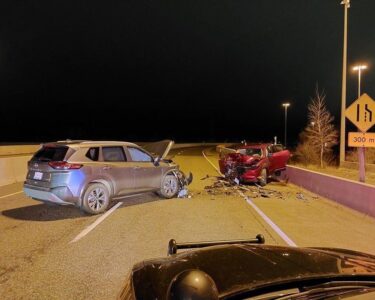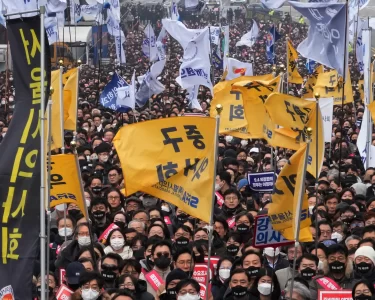RAFAH, Gaza Strip — Two women and a man were killed early Saturday in what witnesses said was an Israeli airstrike on a home in the southernmost part of Gaza, as Israel pursued its military offensive against the Palestinian enclave.
The strike came less than a day after the International Court of Justice ordered Israel to do all it can to prevent death, destruction and any acts of genocide in Gaza. As part of its binding ruling, the top United Nations court asked Israel for a compliance report in a month, meaning the military’s conduct will be under increasing scrutiny.
The court stopped short of ordering a cease-fire, but the orders its judges issued were in part a stinging rebuke of the army’s conduct so far in Israel’s nearly 4-month-long war against Gaza’s Hamas rulers. Friday’s decision came in a case brought by South Africa, which alleged Israel is committing genocide against the Palestinian territory’s people, a charge Israel vehemently denies.
The war has killed more than 26,000 Palestinians, according to local health officials, destroyed vast swaths of Gaza and displaced nearly 85% of a population of 2.3 million people. It was triggered by an unprecedented Hamas attack on southern Israel on Oct. 7 in which militants killed about 1,200 people, mostly civilians, and took about 250 hostages.
The overall Palestinian death toll in the war rose to 26,257 as of Saturday, with 174 deaths over the past day, the Health Ministry in Gaza said. The ministry does not distinguish between combatants and civilians in its count, but has said about two-thirds are women and children. It said the total number of wounded surpassed 64,000.
Israel holds Hamas responsible for civilian casualties, saying the militants embed themselves in buildings used by civilians. Israel says its air and ground offensive in Gaza has killed more than 9,000 militants.
Bilal al-Siksik, who lost his wife, a son and a daughter in Saturday’s strike in Rafah, a town on Gaza’s border with Egypt, said the decision by the world court meant little since it did not stop the war.
“No one can speak in front of them (Israel). America with all its greatness and strength can do nothing,” he said as he stood beside the pile or rubble and twisted metal that was once his home. “What can people do, who have no power or anything?” He said his family was asleep when their residence was struck.
Rafah and its surrounding areas are crammed with more than 1 million people after the Israeli military ordered civilians to seek refuge there from the fighting elsewhere in the territory. Despite those orders, the designated evacuation areas have repeatedly come under airstrikes, with Israel saying it would go after militants as needed.
Some Gaza residents expressed dismay that the U.N. court based in The Hague, Netherlands, did not order an immediate end to the fighting as South Africa had requested.
“The court’s decisions were disappointing to us,” Yahya Saadat, who was displaced from the northern city of Beit Hanoun and now lives in the central town of Deir al-Balah, said late Friday. “We were waiting for the International Court of Justice to issue stricter decisions than that, such as a cease-fire, our return to our homes in the north, and stopping the bloodshed in the Gaza Strip.”
Others saw Friday’s rulings from a 17-judge panel as a significant, if symbolic, step.
“The measures approved by the court are mostly in the interest of the Palestinian people regarding human suffering, violation of international law, and many other issues,” said Mazen Muhaisen, who also was sheltering in Deir al-Balah.
The court ruled that Israel must refrain from harming or killing Palestinian civilians while doing all it can to prevent genocide, including punishing anyone who incites others to support the destruction of Gaza’s people. The judges also ordered Israel to urgently get basic aid to Gaza.
The interim orders did not address the substance of the case — the genocide allegations — and a final ruling is expected to take years.
Although the provisional measures issued Friday are legally binding, it is unclear if Israel will comply. Israeli Prime Minister Benjamin Netanyahu vowed to move ahead with the war, saying the fact that the court did throw out the genocide charges was a “mark of shame that will not be erased for generations.”
The Israeli military said Saturday it had conducted several “targeted raids on terror targets” in the southern Gaza city of Khan Younis, killing “numerous terrorists.” It did not mention Rafah.
The United States, Israel’s closest ally, has strongly supported the offensive but has increasingly called for restraint and for more humanitarian aid to be allowed into Gaza.
Almost four months after the Hamas attack in southern Israel, dozens of hostages remain captive in Gaza. More than a 100 were released in a swap for Palestinian prisoners during a week-long cease-fire in November, and an unspecified number of the remaining 136 hostages are believed to have been killed.
U.S. President Joe Biden spoke with his Egyptian and Qatari counterparts Friday ahead of a trip by his CIA director that is intended to seek progress toward a deal to secure the release of more hostages in exchange for a pause in the fighting.
CIA Director Bill Burns is slated to meet in Europe soon with the head of the intelligence agencies of Israel and Egypt and with the the prime minister of Qatar, according to three people familiar with the matter who insisted on anonymity to discuss the sensitive talks.
Hamas has said it will only release the hostages in exchange for an end to the war and the release of large numbers of Palestinian prisoners held by Israel.






